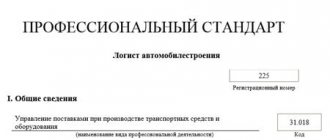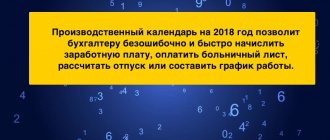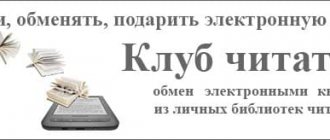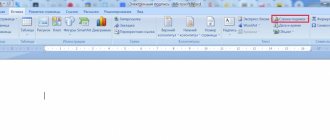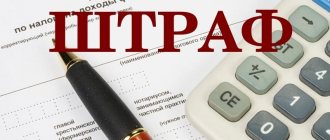Normative base
As for the normative regulation of the issue, it consists of general and specific provisions. General legislative documents include the following standards:
- Labor Code of the Russian Federation. In particular, the activities of professionals are regulated by Chapter 31 of the Labor Code of the Russian Federation. The document provides a description of these provisions, as well as the rules for their application.
- Art. deserves special attention. 57 of the Labor Code of the Russian Federation, which states that it is mandatory to apply professional standards that have been finally developed and have already entered into force.
- Order of the Ministry of Labor No. 147n dated April 12, 2013. Within the framework of this document, a template has been developed according to which the standard is drawn up. That is why most norms are identical in their structure and composition.
- Code of Administrative Violations. Art. 5.27 of the Code of Administrative Offenses of this legislative norm regulates the liability of employers for deliberate refusal to use a professional standard in practice.
In addition to general rules, there are several specific provisions that regulate the process of practical use of rules and requirements:
- A standard approved within the framework of Order of the Ministry of Labor No. 222n dated April 11, 2014, which was developed for mechanics of ships with nuclear power plants, etc. Within the framework of this standard, the positions of mechanical engineer, APPU, chief specialist, and watch foreman are considered.
- Standard approved by Order of the Ministry of Labor and Social Protection of September 8, 2015 No. 612n. Within the framework of this document, we are talking about navigation with the ability to operate equipment located on the ship.
- The auto mechanic document is currently awaiting adoption. Specialists are already working on developing the project, and it is awaiting immediate approval. There are assumptions that the functions of a repairman and technician will be described within its framework.
In addition to this area, there are many other areas of functioning of mechanics, but currently there is no uniform standard for them.
Documents for download (free)
- Mechanic of ships with nuclear power plants, nuclear service ships
- Navigator-mechanic
Where can I find the current list?
The professional standard is considered officially valid only after the order of the Ministry of Labor is issued. Additionally, the document is registered with the Ministry of Justice of the Russian Federation. These two rules are mandatory. download the 2017 register of professional standards from the following resources:
- official website of the Ministry of Labor (through it you can send a notification about the development of a new standard, but this option is available only after registration);
- official website of the Federal State Budgetary Institution (the current database is collected there).
In total, these sites have already posted more than 800 standards. Some of them were developed several years ago. For example, the standard for teachers was developed and put into effect in 2013, and for social workers the need to meet qualifications appeared in 2014. These standards are also included in the 2017 register of professional standards .
Why are professional standards needed?
A mechanic is a working specialist who carries out activities related to the maintenance and repair of devices and equipment. He has a certain level of qualifications and has specialized education. The job title “mechanic” is the main one. There are several private subgroups that characterize the specific specifics of a specialist’s activity. For example, mechanic technician, mechanic mechanic, auto mechanic, mechanical engineer, etc.
In the professional standard, this position can be considered as a possible job title within which employees perform the described options. And also as a list of basic specialties and professions, the listing of which is observed within the framework of additional characteristics.
In addition to the two regulatory documents discussed in the last paragraph, mechanics can perform certain labor functions that are provided for by the professional standards of craftsmen who design and construct space vehicles, prepare and operate vehicles or equipment. In some cases, the employer has the right to be guided by the qualification characteristics from the ETKS
Thus, a well-drafted professional standard is designed to regulate the activities of a specialist, describing his direct functions and tasks, as well as a list of requirements for the qualification level.
Why do you need a job description?
The main purpose of the document is to define the functions and rights that will be assigned to an employee of the enterprise. The functional responsibilities of a mechanic are determined by the company management, together with HR department specialists. The content of the final list may be influenced by the employee’s field of activity. An employee may hold one of the following positions:
- mechanical engineer;
- mechanic for the production of vehicles on a production line;
- driver mechanic;
- garage mechanic;
- chief mechanical engineer.
Typically, the job description of the chief mechanic is taken as a basis and revised taking into account the employee’s position.
By the way! In addition to the specifics of employment, the type of equipment and vehicles that will be under his control may affect the list of mechanics’ functions. For example, a marine mechanic must have the appropriate education and qualifications.
Each company determines its own requirements for applicants for the position of mechanic. We are talking about the required level of education, training, and qualifications. All these nuances are prescribed not only in the employment contract, but also in the job description.
Important! Before signing a cooperation agreement, the employer is obliged to familiarize the future mechanic with the job description against signature.
In addition to the content of information about the employee’s functional responsibilities, the use of a job description is determined by one more point. A document signed by the employee and management can become official evidence in court proceedings.
Scope of application and mandatory use for employees of the enterprise
There are several areas in which the use of professional standards is indispensable:
- organization of training events;
- carrying out certification work;
- supplying the enterprise with highly qualified personnel;
- simplification of tariff gradation;
- improving the quality of equipment maintenance;
- introduction of progressive remuneration systems.
The fact that the document requires mandatory use by mechanics performing duties at public and private enterprises is reflected in Art. 57 Labor Code of the Russian Federation. The code states that if a norm has been developed, it is recognized as being complied with.
If in some area the document has not been developed or is at the preparation stage, you should rely on the provisions of the unified tariff and qualification directory or job description.
How to name the position of a mechanic in accordance with the professional standard?
Answer to the question: As a general rule, the employer determines job titles and qualification requirements at his own discretion. But if labor legislation connects the performance of work in certain positions or professions with the provision of compensation and benefits (early retirement, additional leave, increased wages) or establishes any restrictions, then the names of such positions and professions, qualification requirements must comply with qualification reference books, professional standards. The specified compliance must be observed both in the employment contract with the employee, where his position will be indicated (performing work in the profession), and in the organization’s staffing table.
This is stated in Art. 57 Labor Code of the Russian Federation. This rule applies to: 1. Employees who work in hazardous working conditions; 2.
Teachers, medical workers, “northern” employees and others who have the right to a preferential pension: ; 3. Any other employees, if, in accordance with the Labor Code of the Russian Federation, other federal laws, the provision of compensation and benefits or the presence of restrictions are associated with the performance of work in certain positions, professions, specialties.
Read more about here. Additional leave, additional pay for hazardous working conditions, a shortened working week are also benefits and compensation provided to an employee for working in hazardous conditions. But the EKS and ECTS have not been canceled due to the introduction of professional standards.
See letter from the Ministry of Labor. That is, you can continue to use them in your work, both along with professional standards and in their absence. Please note that in relation to employees filling positions for which the employee is entitled to guarantees, compensation, benefits, the requirements of the prof.
We recommend reading: Support in obtaining a work permit for emigrants
standards OR qualification reference books are mandatory now and were previously mandatory since December 15, 2012 (Article 57 of the Labor Code of the Russian Federation, Federal Law dated December 3, 2012 N 236-FZ establishes the mandatory application of the requirements contained in professional standards, including when hiring workers to work in the following cases:
- According to Article 57 of the Labor Code of the Russian Federation, the names of positions, professions, specialties and qualification requirements for them must correspond to the names and requirements specified in qualification reference books or professional standards, if, in accordance with other federal laws, the provision of work for these positions, professions, specialties is associated with compensation and benefits or the presence of restrictions;
- According to the Labor Code of the Russian Federation, the requirements for the qualifications of employees contained in professional standards are mandatory for the employer in cases where they are established by other federal laws, and other regulatory legal acts of the Russian Federation.
In the first case, you have an alternative - use professional standards or reference books.
And in the second, you need to look at the law for each specific position. If it indicates the mandatory use of a professional standard, then it will be the professional standard that needs to be applied.
Job responsibilities
In accordance with the document approved by Order of the Ministry of Labor No. 222n dated April 11, 2014, a ship mechanic performs the following functions:
- operation of technical equipment located on ships;
- organization of events within the walls of the nuclear-mechanical enterprise;
- ensuring nuclear safety for all crew members.
In addition, a higher education diploma and work experience of at least 2 years are required, depending on the specific position for which the master is applying. If we talk about the second adopted professional standard, approved by Order of the Ministry of Labor dated September 8, 2015 No. 612n, then the list of job responsibilities includes solving the following tasks:
- management of processes occurring on the ship;
- competent operation of all available systems;
- security formation;
- placement of cargo units on the ship;
- organization of passenger transportation.
The execution of these options can be carried out by persons who have secondary vocational education within the framework of the considered specialty “navigation”.
Since a professional standard has not been developed for representatives of other professions in the field of mechanics, it is necessary to rely on the standards of the job description and ETKS. In accordance with them, the mechanic performs the following functions:
- ensuring reliable and coordinated operation of all pieces of equipment;
- carrying out technical inspection and repair of protection devices;
- organization of scheduling for inspections and applications;
- taking part in the installation of new pieces of equipment;
- carrying out all kinds of accounting activities;
- presentation of labor conditions to subordinate specialists;
- analysis of the causal factors of downtime and explanation of their duration;
- development and implementation of progressive methods for repair and restoration work;
- preparation of lubricants for servicing equipment units;
- determination of technical accuracy of mechanisms;
- implementation of rationalization proposals to improve the work process;
- strict adherence to all rules and regulations related to labor protection and technical safety;
- management of employees of a particular department;
- execution of basic assignments for work.
What is the professional standard of a manager?
In accordance with labor legislation (Articles 195.1, 195.2 and 195.3 of the Labor Code of the Russian Federation), an employee’s qualifications are a complex of the level of knowledge, skills, professional skills and professional awareness of the employee. A professional standard describes the main qualities of a set of data that constitute an employee’s qualifications and are necessary for him to conduct professional activities.
Professional standards for a manager are established by three regulations:
- By Order of the Ministry of Labor of the Russian Federation “On approval of the professional standard “Information Technology Manager”” dated October 13, 2014 No. 716n.
- Order of the Ministry of Labor of the Russian Federation “On approval of the professional standard “Product Manager in the field of information technology”” dated November 20, 2014 No. 915n.
- By Order of the Ministry of Labor of the Russian Federation “On approval of the professional standard “Sales Manager of Information and Communication Systems”” dated October 5, 2015 No. 687n.
These documents have the same structure and consist of the following sections:
- Basic data;
- description of labor functions;
- characteristics of general labor functions;
- information about organizations that have developed professional standards.
Employee compliance requirements and working conditions
In order for a candidate to be able to occupy a particular position, a number of conditions must be met and a certain set of requirements must be met:
- presence of specialized secondary or higher education in the field of mechanics;
- 1 year of work experience depending on the rank and position for which the candidate is applying;
- taking special training courses;
- possession of theoretical knowledge and practical skills in servicing complex mechanisms.
The working conditions of a specialist are difficult and imply a readiness to perform job duties outside of normal working hours.
Liability for non-use
If an employer deliberately ignores the requirement to apply this document in practice, he bears administrative liability in accordance with Art. 5.27 Code of Administrative Offenses of the Russian Federation.
Dismissal due to non-compliance with standard
An employee’s failure to comply with the approved professional standards is not a reason for his dismissal.
This measure is permissible only after the employee refuses to undergo training and to take up the proposed, lower-paid position. The law prohibits the dismissal of pregnant employees, as well as persons who care for disabled people and children under 3 years of age. Thus, a mechanic is a master who is subject to a large number of requirements and conditions for carrying out professional activities.
General requirements for specialists hired after the introduction of the professional standard are set out below.



